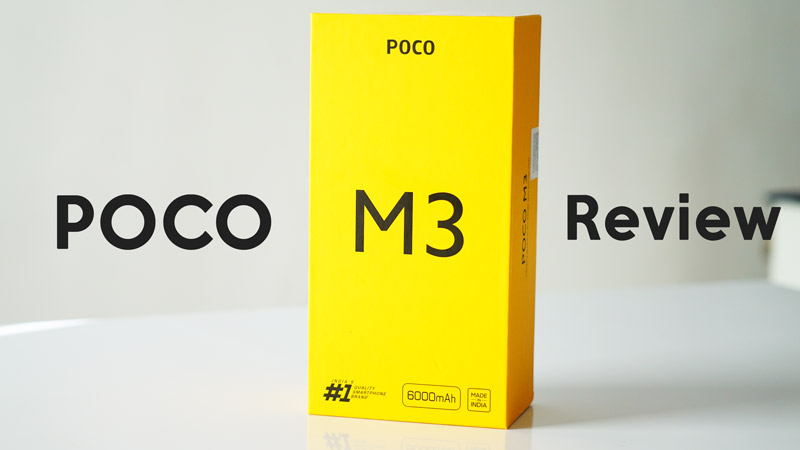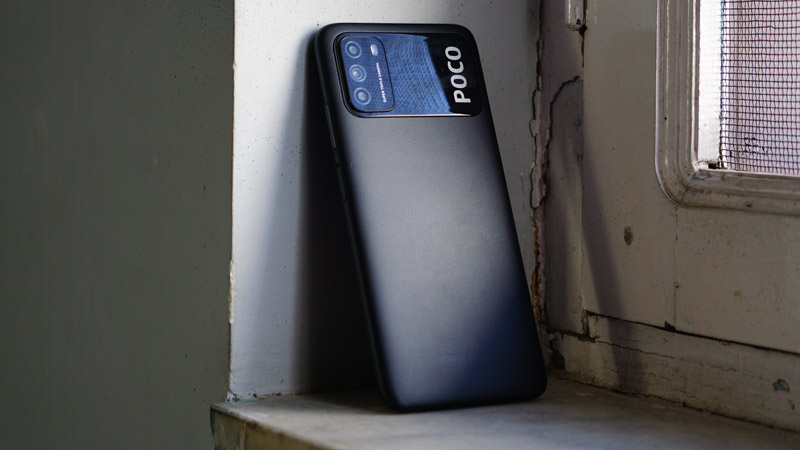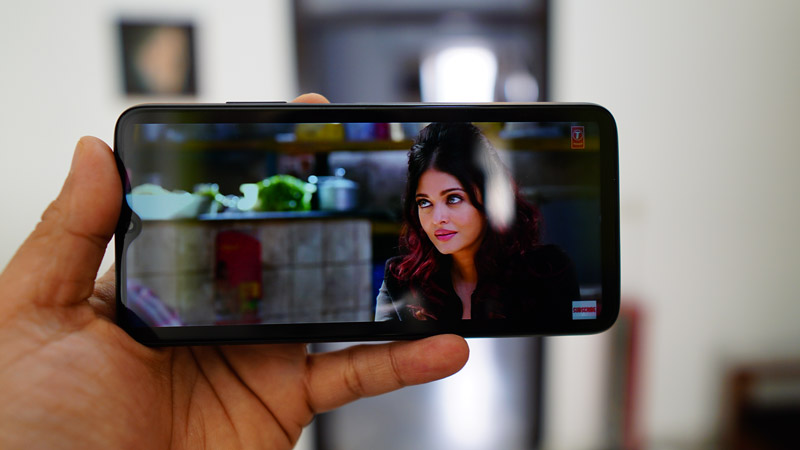Poco M3 Review – The Budget King
I have been using the POCO M3 for the last week, and in this article, we are going to have a detailed look at the device’s performance, gaming, experience, and camera capability.
The Poco M3 is available for purchase on Flipkart at Rs. 11,999 for the 6 GB Ram and 128 GB storage option. The 64 GB version is available for Rs. 10,999.
The Poco M3 is the successor of the Poco M2, which was launched in October last year(2020).
Unboxing
The Poco M3 comes in an offbeat yellow box and a SIM card tray ejection tool, a transparent Silicone case, a 22.5 Watts fast charger, and a USB to Type-C cable.

I bought the black color, though you can buy it in Blue or Yellow color.
Design & Build Quality
Talking about its build quality, So it comes with a textured leather cover finish at the back, which provides a nice grip and is not prone to micro scratches. Also, since the back cover is not made of glass, it keeps the weight in check.

The backside has a large camera module that houses a triple rear camera setup and the POCO branding.
I like the back camera module and the overall design of the phone.
At the front, the Poco M3 has a waterdrop notch that houses a selfie camera.
It comes with a thickness of 9.6mm and weighs 198 grams. The weight distribution is balanced, and you don’t find the device too bulky when using it.
I have not added a back cover or a tempered glass that I am sure will make it a bit heavier.
Furthermore, the display is protected by a Gorilla Glass 3.
Display
The Poco M3 comes with a 6.53 inch IPS LCD waterdrop notch display along with an FHD+ (2340*1080) pixels resolution, including an aspect ratio of 19.5:9 and a 395ppi pixel density.

Additionally, it also has a 400 nits brightness so that you don’t have to face any problems when using in sunlight.
The display has a 70% NTSC color gamut and comes with a cold tone – out of the box. I don’t think it has very accurate colors and feels bluish.
There is a color temperature setting under the display options, and you can adjust the color temperature slightly to make it less bluish.
Performance, Benchmark, and Operating System
Powering the Poco M3 is a Qualcomm Snapdragon 662 octa-core processor fabricated on an 11nm chipset and clocked at a 2 Ghz speed.
For enjoying gaming, the device is equipped with an Adreno 610 GPU. You can play games like Call of Duty(But you can play these heavy games at medium settings).
.jpg)
There is not much heating after playing the games for long, and the battery drain is also reasonable.
If we talk about the operating system, So the device runs on an MIUI 12 based on an Android 10 and comes with the POCO launcher.
The UI feels very similar to the software available in the Redmi phones.
.jpg)
All the settings and most Apps (including the camera App) have nearly the same options as the Redmi Note 9 Prime that I have been using for some weeks.
Also, there are some Ads, mostly on the lock screen. The overall performance is decent, but there is a slight lag when opening too many chrome tabs or when several Apps are open.
It is not because of the Ram; the processor is strictly mid-range and is not as fast as the SD 730 or 750 found in more expensive phones.

Here are some of the benchmark scores.
Benchmark Scores:
- AnTuTu Score – 182,916
- Geekbench Single-Core Score – 316
- Geekbench Multi-Core Score – 1419
The Benchmark Scores are not very high, and we are not expecting more from the processor. However, it is a decent performer for day-to-day usage, and you won’t face any issues.
Fingerprint Sensor & Face unlock.
The Poco M3 comes with a trendy side-mounted fingerprint sensor that will work fine. Also, the power button and the Volume button are well built and very tactile.
Further, It also has an AI face unlocking support for more convenience.
Camera Quality
At the rear, the Poco M3 has a Triple camera setup carrying a 48MP main camera with an aperture of f/1.79, a 2MP macro lens with an aperture of f/2.4, and a 2MP depth sensor along with an aperture of f/2.4.
.jpg)
Here are some of the images that I have shot using the main camera. I’m not too fond of the tiny 2 MP cameras and don’t find them very useful for most people. In fact, companies should start including just 1-2 lenses that are high quality and don’t have 3-4 gimmicky cameras.
.jpg)
.jpg)
Selfie Camera
At the front, it has an 8MP selfie camera at the front that houses a waterdrop notch display and an aperture of f/2.05.
The indoor selfies are bad, and the skin tones become reddish-pink. The selfies taken outdoor are fine and have good details and skin colors. I think POCO should look into this and fix the issue of a red tint in indoor selfies.
.jpg)
.jpg)
Further, the camera provides you with document mode, night mode, AI scene detection, AI beautify portrait mode, panorama, time-lapse, and up to 1080P video support.
Battery
One of the reasons to buy the POCO M3 is its massive 6000mAH battery capacity. Having a huge battery is not always great as it increases the weight and makes the device bulky.
The POCO M3 comes with 18 Watts fast charging support, and it is better in comparison to what we are getting from other brands, even Redmi Note 9 Prime in the same price range.
Furthermore, it also supports reverse charging.
In my limited experience, the phone offers 1.5 days of battery life with ease; and takes about 1.8 hours to charge fully.
As per the company, it offers 583 hours standby time, 40 hours calling, 196 hours of music, 17 hours of video support.
Connectivity
It comes with a various connectivity option that includes WiFi, Bluetooth 5.0, G.P.S, Infrared port, F.M radio, a 3.5mm earphone jack (located at the top side), Dual SIM 4G support, and a USB Type-C cable for charging.
Also, the call quality on the device is above average, and I didn’t face any issues with my phone.
But, it does not have NFC support or 5G (nor expected in this price range).
Sound & Quality
Like Poco M2, this phone also comes with dual speakers, which will enhance the sound experience while watching movies and videos, and even while listing to music.
The speaker volume is good, and you can listen to songs, calls, or music without any issues.
The sound quality is as good as other mid-range phones, nothing special when playing music from the headphone jack. There is no AMP of anything special to offer better Audio.
Competitors
The Poco M3 competes with the Oppo A31, Motorola Moto G9 Power, Redmi 9 Prime, Redmi 9 Power, and Realme Narzo 20, and Samsung Galaxy A12.
These are some phone which has the same features as Poco M3 and come within the same price range.
Pros and Cons
Pros:
- Good Design and Stylish.
- Massive battery backup and Fast Charging.
- Fast Performance in its price range.
Cons:
- The front camera is average.
- The display is not very color accurate.
- Bit bulky and heavy.
Concluding Thoughts
Overall the POCO M3 offers plenty for the price and comes with decent performance, battery life, and the 48 MP rear camera also works great.
However, MIUI feels too familiar and even has Ads. POCO needs to distinguish more from the MIUI and offer a different experience, something like a stock Android or the Oneplus Oxygen OS, to make things more interesting for the brand.
People already have MIUI and affordable MI phones – What’s the real need for a POCO when everything is same with some minor cosmetic changes.
Overall, it is a terrific offering for the price, and if you are buying it, you will be pleased with the overall quality and features that the phone packs at such an affordable price tag.
The below-mentioned table gives you a brief idea of the specs of the latest Poco M3.
| Specification | Poco M3 |
| Processor | Qualcomm Snapdragon 662 octa-core processor clocked at 2Ghz |
| GPU | Adreno 610 |
| RAM | 6GB LPDDR4X |
| Storage | 64GB UFS 2.1 and 128GB UFS 2.2 |
| Display | 6.53 inch IPS LCD with FHD+ (2340*1080) pixels resolution |
| Expandable Storage | up to 512GB |
| Operating System | Android 10 based on MIUI 12 |
| Rear camera | Triple camera (48MP(f/1.79)+2MP(f/2.4)+2MP(f/2.4)) |
| Front camera | 8MP(f/2.05) selfie camera |
| Thickness | 9.6mm |
| Weight | 198 grams |
| Battery | 6000mAH |
| Connectivity | Dual SIM 4G and a 3.5mm jack |
| Color options | Cool blue, Power black, and Poco yellow |
| Price | Rs 12,799(Base variant) |
| Launch Date | 2 February 2021 |
| Candytech rating | 8.5/10 |
| Availability | Amazon, Flipkart, and other E-Stores |
The first phone I reviewed from the brand was the iconic Poco F1.


